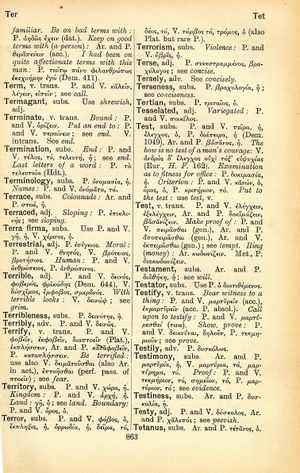tetanus: Difference between revisions
From LSJ
ἐν δὲ δικαιοσύνῃ συλλήβδην πᾶσ' ἀρετὴ ἔνι → in justice is all virtue found in sum, in justice is every virtue there is, in justice every virtue is brought together, justice contains in itself all the virtues
(6_16) |
(D_9) |
||
| Line 6: | Line 6: | ||
{{Lewis | {{Lewis | ||
|lshtext=<b>tĕtănus</b>: i, m., = [[τέτανος]],><br /><b>I</b> a [[stiffness]] or [[spasm]] of the [[neck]], [[tetanus]], Plin. 23, 1, 24, § 48; 31, 10, 46, § 122; Scrib. Comp. 101 (in Cels. 4, 3, written as Greek). | |lshtext=<b>tĕtănus</b>: i, m., = [[τέτανος]],><br /><b>I</b> a [[stiffness]] or [[spasm]] of the [[neck]], [[tetanus]], Plin. 23, 1, 24, § 48; 31, 10, 46, § 122; Scrib. Comp. 101 (in Cels. 4, 3, written as Greek). | ||
}} | |||
{{Gaffiot | |||
|gf=<b>tĕtănus</b>, ī, m. ([[τέτανος]]), contraction des nerfs, crampe, tétanos : Plin. 23, 48 ; 31, 122. | |||
}} | }} | ||
Revision as of 07:06, 14 August 2017
English > Greek (Woodhouse)
subs.
Ar. and P. τέτανος, ὁ.
Latin > English (Lewis & Short)
tĕtănus: i, m., = τέτανος,>
I a stiffness or spasm of the neck, tetanus, Plin. 23, 1, 24, § 48; 31, 10, 46, § 122; Scrib. Comp. 101 (in Cels. 4, 3, written as Greek).
Latin > French (Gaffiot 2016)
tĕtănus, ī, m. (τέτανος), contraction des nerfs, crampe, tétanos : Plin. 23, 48 ; 31, 122.

